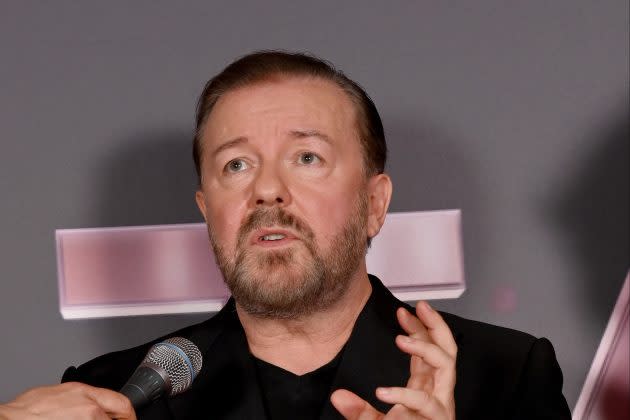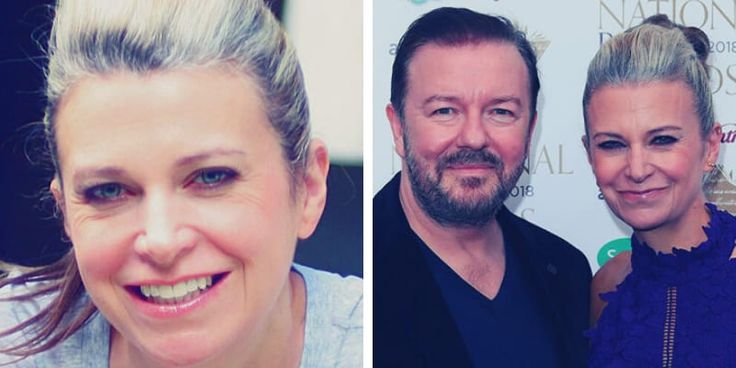JUST NOW:There’s Something About Free Speech That You Need To Hear on Both Sides, According To Ricky Gervais…..
In an era marked by heightened sensitivity and robust debates over free speech, comedian Ricky Gervais has become a prominent voice advocating for a balanced perspective. Known for his sharp wit and controversial remarks, Gervais has navigated the complex landscape of free expression with a philosophy that emphasizes the necessity of understanding and respecting differing viewpoints. In his latest discourse, Gervais offers a compelling argument about why hearing both sides of the free speech debate is crucial in maintaining a healthy and open society.
**Understanding Free Speech: The Basics**
Free speech, a cornerstone of democratic societies, allows individuals to express their thoughts and opinions without fear of censorship or retaliation. However, this fundamental right often comes with nuanced challenges and dilemmas. Gervais, through his extensive career in comedy and public commentary, has confronted these complexities head-on, arguing that the right to free speech is not only about the freedom to say what one believes but also about listening to and considering opposing views.
In a recent discussion, Gervais elaborated on the notion that free speech should be understood as a dialogue rather than a monologue. “Free speech isn’t just about saying what you want; it’s also about being able to hear what others have to say,” he explained. “If we only listen to ourselves and never consider alternative perspectives, we’re not really engaging in free speech. We’re just creating echo chambers.”
**The Dangers of Censorship**
One of Gervais’s primary arguments against overly restrictive censorship is that it often stifles genuine discourse and hampers the pursuit of truth. He asserts that while certain speech may be offensive or controversial, suppressing it does not necessarily lead to a more enlightened or harmonious society. Instead, it can push dissenting views underground, where they may fester and become more extreme.
Gervais uses his own experiences as a comedian to illustrate this point. “In comedy, we often push boundaries and challenge societal norms,” he said. “Sometimes, that means saying things that might upset people. But it’s important to remember that humor can be a way of exploring and understanding difficult subjects. If we’re not allowed to discuss these topics openly, we miss out on important conversations.”
**The Role of Comedy in Free Speech**
Comedy, as Gervais points out, plays a unique role in the free speech landscape. It provides a platform for examining controversial or sensitive issues in a manner that can provoke thought and stimulate discussion. For Gervais, humor is not just a form of entertainment but a tool for addressing complex social and political issues.
“In comedy, you can tackle subjects that might be too uncomfortable to discuss directly,” Gervais explained. “It allows us to explore ideas and viewpoints in a way that can be both thought-provoking and entertaining. But if we’re constantly censoring ourselves out of fear of offending someone, we lose that valuable opportunity for dialogue.”
Gervais acknowledges that the line between humor and harm can be thin, and he advocates for a responsible approach to comedy. “It’s about finding the balance,” he said. “You can push boundaries without crossing into hate speech or bigotry. The goal should be to encourage thought and discussion, not to perpetuate harm.”
**The Importance of Listening**
A significant aspect of Gervais’s argument is the importance of actively listening to and engaging with opposing viewpoints. He believes that understanding and considering different perspectives is essential for a healthy democratic process. “If we’re only exposed to one side of an argument, we’re not truly informed,” Gervais said. “It’s only by listening to both sides that we can form a well-rounded opinion and contribute meaningfully to the conversation.”
Gervais’s emphasis on listening is also a call to action for individuals to approach discussions with an open mind. He argues that true free speech involves not only expressing one’s own views but also respecting the right of others to hold differing opinions. “It’s easy to get caught up in our own beliefs and dismiss opposing views,” he said. “But real dialogue requires us to engage with and understand those differences.”
**Navigating the Complexities**
Navigating the complexities of free speech requires a nuanced approach that balances the right to express oneself with the responsibility to avoid causing harm. Gervais advocates for a culture where open dialogue is encouraged and where people are willing to confront uncomfortable truths. “It’s about finding the middle ground,” he said. “We need to be able to speak freely while also being mindful of how our words impact others.”
For Gervais, the key is fostering an environment where differing opinions can be expressed and debated openly. He believes that this kind of engagement strengthens democratic institutions and promotes a more informed and tolerant society. “Free speech is not just about the freedom to say what you want,” he said. “It’s about creating a space where all voices can be heard and where we can engage in meaningful dialogue.”
**Moving Forward**
As discussions about free speech continue to evolve, Gervais’s perspective offers a valuable reminder of the importance of both expressing and listening. His emphasis on understanding different viewpoints and engaging in open dialogue highlights the need for a balanced approach to free speech that respects both individual rights and the collective good.
In conclusion, Ricky Gervais’s insights into the free speech debate underscore the necessity of hearing both sides to maintain a vibrant and democratic society. By advocating for open dialogue and responsible discourse, Gervais champions a vision of free speech that values both expression and understanding. As society navigates the complexities of this fundamental right, his perspective serves as a crucial reminder of the importance of fostering a space where all voices can be heard and respected.


